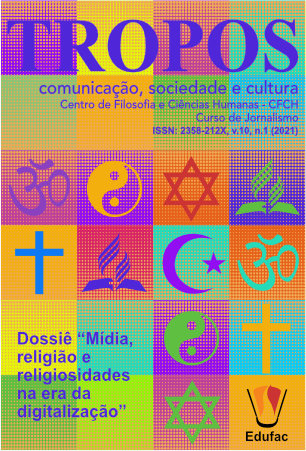INFLUENCIADOR DIGITAL E OPINIÃO PÚBLICA: UMA ANÁLISE SOBRE VISIBILIDADE A PARTIR DA NARRATIVA DE FELIPE NETO NO PROGRAMA RODA VIVA
Keywords:
Influenciador Digital; Opinião Pública; Visibilidade; Felipe Neto; Roda Viva.Abstract
The media and academic spheres have reflected on the role of the digital influencer in communication. The purpose of this study is to make an analysis about the construction of a performance management of itself, thus guaranteeing a mediated visibility from one to many. Using Felipe Neto's narrative, discourse and performance as an example during his participation in the television show 'Roda Viva', the article analyzes the visibility around the individual and the private space that gains a new guise and becomes part of the public opinion due to the use of the image on social networks and video platforms. Based on this theme, the work open a discussion around the reorganization of public opinion due to the appropriation of subjects that were previously intended for specialists and that are now conducted by digital influencers through a narrative that involves entertainment and fun.
Downloads
References
DUNKER, Christian. Subjetividade em tempos de pós-verdade. In: DUNKER, Christian; TEZZA, Cristovão; FUKS, Julián; TIBURI, Marcia; SAFATLE, Vladimir. Ética e pós-verdade. Porto Alegre: Dublinenses, 2017.
FILHO, Eduardo F. Felipe Neto no ‘Roda Viva’ vira porta-voz dos jovens inconformados. Veja, São Paulo, 19 de maio de 2018. Disponível em: https://veja.abril.com.br/blog/tela-plana/felipe-neto-no-roda-viva-vira-porta-voz-dos-jovens-inconformados/. Acesso em 18/11/2020.
FLUSSER, Vilém. O mundo codificado: por uma filosofia do design e da comunicação. São Paulo: Ubu Editora, 2017.
FONTENELLE, Isleide. Cultura do Consumo: fundamentos e formas contemporâneas. Rio de Janeiro: Editora FGV, 2017.
HALL, Stuart. Da diáspora: identidades e mediações culturais. Belo Horizonte/Brasília: Editora UFMG/Representação, 2003.
JAMESON, Fredric. Pós-modernismo, a lógica cultural do capitalismo tardio. São Paulo: Ática, 1996.
LIPOVETSKY, Gilles, SERROY, Jean. A cultura-mundo: resposta a uma sociedade desorientada. São Paulo: Companhia das Letras, 2011.
PICHONELLI, M. Goste ou não entrevista de Felipe Neto ao Roda Viva já é histórica. Uol, São Paulo, 18 de maio de 2020. Disponível em: https://matheuspichonelli.blogosfera.uol.com.br/2020/05/18/goste-se-ou-nao-entrevista-de-felipe-neto-ao-roda-viva-ja-e-historica/. Acesso em 18/06/2020.
RODA VIVA | FELIPE NETO. [S.I.: S. N.], 2020. 1 VÍDEO (1h36min17seg). Publicado pelo canal Roda Viva. Disponível em https://www.youtube.com/watch?v=KQ1CQqNveac&t=5195s. Acesso em 19/06/2020.
SIBILIA, Paula. O show do eu: A intimidade como espetáculo. 1ª edição. Rio de Janeiro: Editora Nova Fronteira, 2008.
SILVERSTONE, Roger. La moral de los medios de comunicación. Buenos Aires: Amorrortu, 2010.
THOMPSON, John B. A nova visibilidade. In: Revista Matrizes, Ano 2, Volume 1, n. 2, 2008. Disponível em: http://www.matrizes.usp.br/index.php/ matrizes/article/view/82/124. Acesso em 18/10/2020.
ZELIZER, Viviana A. A negociação da intimidade. Petrópolis: Vozes, 2011.
Downloads
Published
How to Cite
Issue
Section
License
Transferência de direitos autorais:
Declaro que após aprovado para publicação a Revista Tropos editada pela Universidade Federal do Acre (UFAC), passará a ter os direitos autorais do trabalho, que se tornarão propriedade exclusiva da Revista, sendo permitida a reprodução total ou parcial desde que devidamente referenciada.

